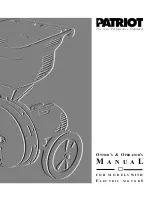
YORK INTERNATIONAL
30
FORM 160.54-O2(1102)
FORM 160.54-O2(1102)
31
YORK INTERNATIONAL
CONDENSERS AND EVAPORATORS
GENERAL
Maintenance of condenser and evaporator shells is
important to provide trouble free operation of the chiller.
The water side of the tubes in the shell must be kept
clean and free from scale. Proper maintenance such as
tube cleaning, and testing for leaks, is covered on the
following pages.
CHEMICAL WATER TREATMENT
Since the mineral content of the water circulated through
evaporators and condensers varies with almost every
source of supply, it is possible that the water being used
may corrode the tubes or deposit heat resistant scale in
them. Reliable water treatment companies are available
in most larger cities to supply a water treating process
which will greatly reduce the corrosive and scale form-
ing properties of almost any type of water.
As a preventive measure against scale and corrosion and
to prolong the life of evaporator and condenser tubes,
a chemical analysis of the water should be made pref-
erably before the system is installed. A reliable water
treatment company can be consulted to determine wheth-
er water treatment is necessary, and if so, to furnish the
proper treatment for the particular water condition.
CLEANING EVAPORATOR AND CONDENSER TUBES
Evaporator
It is difficult to determine by any particular test whether
possible lack of performance of the water evaporator
is due to fouled tubes alone or due to a combination
of troubles. Trouble which may be due to fouled tubes
is indicated when, over a period of time, the cooling
capacity decreases and the split (temperature difference
between water leaving the evaporator and the refrigerant
temperature in the evaporator) increases. A gradual drop-
off in cooling capacity can also be caused by a gradual
leak of refrigerant from the system or by a combination
of fouled tubes and shortage of refrigerant charge. An
excessive quantity of oil in the evaporator can also con-
tribute to erratic performance.
Condenser
In a condenser, trouble due to fouled tubes is usually
indicated by a steady rise in head pressure, over a period
of time, accompanied by a steady rise in condensing
temperature, and noisy operation. These symptoms may
also be due to foul gas buildup. Purging will remove the
foul gas revealing the effect of fouling.
TUBE FOULING
Fouling of the tubes can be due to deposits of two types
as follows:
1.
Rust or sludge
– which finds its way into the tubes
and accumulates there. This material usually does
not build up on the inner tube surfaces as scale, but
does interfere with the heat transfer. Rust or sludge
can generally be removed from the tubes by a thor-
ough brushing process.
2.
Scale
– due to mineral deposits. These deposits,
even though very thin and scarcely detectable upon
physical inspection, are highly resistant to heat
transfer. They can be removed most effectively by
circulating an acid solution through the tubes.
TUBE CLEANING PROCEDURES
Brush Cleaning of Tubes
If the tube consists of dirt and sludge, it can usually be
removed by means of the brushing process. Drain the
water sides of the circuit to be cleaned (cooling water
or chilled water) remove the heads and thoroughly
clean each tube with a soft bristle bronze or nylon
brush.
DO NOT USE A STEEL BRISTLE BRUSH
.
A steel brush may damage the tubes.
Improved results can be obtained by admitting water into
the tube during the cleaning process. This can be done by
mounting the brush on a suitable length of 1/8" pipe with
a few small holes at the brush end and connecting the
other end by means of a hose to the water supply.
The tubes should always be brush cleaned before acid
cleaning.
ACID CLEANING OF TUBES
If the tubes are fouled with a hard scale deposit, they
may require acid cleaning. It is important that before acid
cleaning, the tubes be cleaned by the brushing process
described above. If the relatively loose foreign material
is removed before the acid cleaning, the acid solution
will have less material to dissolve and flush from the
tubes with the result that a more satisfactory cleaning job
will be accomplished with a probable saving of time.
Acid cleaning should only be per-
formed by an expert. Please consult
your local water treatment represent-
ative for assistance in removing scale
buildup and preventative maintenance
programs to eliminate future prob-
lems.
6






































